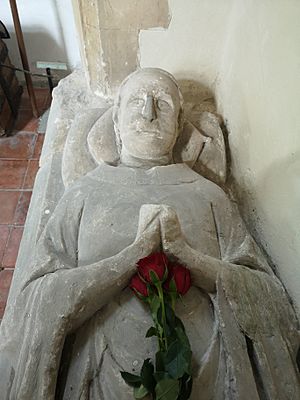William of Heytesbury facts for kids
William of Heytesbury was an important English thinker who lived a long time ago, from about 1313 to 1372 or 1373. He was a philosopher and a logician. This means he was very good at thinking deeply about big ideas and solving problems using logic. He is most famous for being one of the "Oxford Calculators" at Merton College in Oxford.
Quick facts for kids
William of Heytesbury
|
|
|---|---|
 |
Contents
Who Was William of Heytesbury?
William of Heytesbury became a fellow (a senior member) at Merton College in Oxford by the year 1330. He was part of a group called the "Oxford Calculators." These were smart thinkers at Oxford University who used math and logic to understand how things move and change. They were like early scientists and mathematicians.
Heytesbury's Big Ideas
William of Heytesbury used his strong logic skills to study some very tricky problems. He looked at:
- Divisibility: How things can be divided into smaller and smaller parts, almost forever.
- The Continuum: This is about things that are continuous, like time or space, where there are no gaps.
- Kinematics: This is the study of motion. He tried to understand how objects move and change speed.
His most important work was a book called Regulae solvendi sophismata. This Latin title means Rules for Solving Sophisms. A sophism is a clever but misleading argument. Heytesbury's book helped people figure out how to solve these tricky logic puzzles. He wrote this important book around 1335.
Leading Oxford University
William of Heytesbury was also a leader at Oxford University. He served as the Chancellor of the university from 1371 to 1372. The Chancellor is like the head of the university.
What Did Heytesbury Write?
William of Heytesbury wrote several important books and papers. Here are some of his well-known works:
- 1335 - Regulae solvendi sophismata (Rules for Solving Sophisms): This was his most famous book, helping people understand complex arguments.
- 1483 - De probationibus conclusionum tractatus regularum solvendi sophismata (On the Proofs of Conclusions from the Treatise of Rules for Resolving Syllogisms): This book, published later, continued his work on logic and proofs.
- Liber Calculationum (Book of Calculations): This work showed his interest in using math and logic to understand the world.
 | Chris Smalls |
 | Fred Hampton |
 | Ralph Abernathy |

